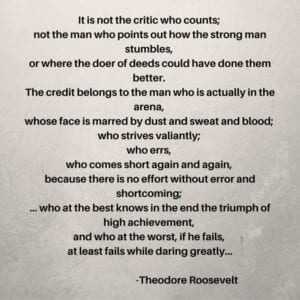
What do you think about when you hear the words: divorce stigma?
Do you think about a time – say in the late 1800s maybe – when getting divorced was taboo? Do you think about a particular culture that frowns on (or won’t allow) divorce? Or do you think about how we in America view divorcing people today, in the 21st century?
Chances are the last answer was probably NOT your first answer.
Yet, divorce stigma is alive and well in our modern world. It often looks different than it did in the past. It also often comes from a surprisingly different source than what you might think. (… more on that a little later…)
But in many ways, getting divorced today still feels shameful. It still makes you feel like you’re a colossal failure.
[amp-optin id=11936]
Sure, people might not tell you to your face that they think you’re a failure. But you still feel it.
You see the judgment in their eyes when you tell them you’re getting a divorce. You hear the mildly mocking tone in their voice when they ask, “What happened?” Most of all, you feel their disdain as you suddenly become a non-person, someone who is no longer invited to social gatherings and events.
The fact that you may not have to wear a giant red “D” on your chest doesn’t change the fact that you still feel like a failure because you got divorced.
But before you beat yourself up too much, you may want to ask yourself one simple question: Is it true? Is it really true that you’re a failure because you divorced?
The Meaning of Failure
Webster’s Dictionary defines failure as “a fracturing or giving way under stress.” That certainly describes what happens to marriages that end in divorce. They fracture. They break under the stress of whatever burden was too big for them to carry.
Yet, while this definition may be accurate, it’s certainly not complete.
A broader definition of “failure” is “a lack of success.” If you don’t achieve whatever it is that you set out to do, you fail.
Applying this definition to marriage, if you don’t stay married to the same person until one of you dies, you “fail.”
But is that really the right measuring stick for “failure” in a marriage?

How Do You Define Failure?
In order to understand what it means to fail in marriage, you first have to know what it means to succeed. You must have a clear vision of what a “successful” marriage is. Without knowing what success looks like, you can’t possibly define failure.
Interestingly, most people (especially most married people) never stop to think about what a successful marriage actually is.
Is a “successful marriage” one which is grounded in a deep, fulfilling relationship? Is it a genuine partnership, where there’s a healthy give-and-take and both spouses get their needs met most of the time?
Or is a “successful marriage” simply one that lasts until somebody dies?
Defining a successful marriage solely as an endurance test makes most people squirm. People expect way more out of marriage these days than that.
The problem is that those same people often see the act of getting divorced as a failure.
Yet, if just getting divorced is a failure, then just staying married must be a success.
Using that definition, a marriage that involves physical, sexual, financial, or emotional abuse is “successful.” Staying married to a serial cheater or someone who gambles away your life savings makes you a success. The same is true if you stay married to someone you can’t stand anymore, regardless of the fact that your marriage has been dead for years.
In today’s world, defining a “successful marriage” in any of those ways seems wrong. After all, isn’t marriage supposed to lead us all to our own personal “happily ever after?”
The Problem With “Happily Ever After”
In our society, we’re all brought up with the idea that someday we’re going to find our Prince (or Princess) Charming, get married, and live happily ever after for the rest of our days. Every romantic comedy, fairy tale, and Disney movie ingrains in us the idea that once we find “the one” our lives will be filled with eternal bliss.
Interestingly, those movies rarely last past the moment when the prince and princess ride off into the sunset together. They don’t show what happens to the lovers a year or two later, when the endorphin rush of being in love has worn off and they’re up to their eyeballs in work and kids.
It’s easy to assume marriage leads to “happily ever after” when you never look past the wedding day.

We’re Getting Mixed Messages
Another problem with the myth of “happily ever after” is that it often gets into a fistfight with the idea of marriage being forever.
Think about it.
We are all taught that marriage is “til death to you part.” We’re also taught that our spouse should be our best friend, fabulous lover, business partner, co-parent, confidante and more. In addition, we’re told that we are entitled to find both happiness and true love in this life.
But what happens when your spouse ISN’T all – or even ANY – of the things that s/he was supposed to be? What happens when, in spite of your best intentions and maybe even your best efforts, you’re NOT happily married? What do you do when you realize that your spouse ISN’T your true love… and maybe never was?!
Now what?
[amp-optin id=11936]
Well, if you believe that marriage is forever, you’re stuck. You can’t get a divorce without feeling the stigma of having failed.
Yet, if you stay in a chronically unhappy or a loveless marriage, you will probably never find the happiness or true love that you’re supposed to have. So, you also failed.
Either way, you lose.
Of course, there are those who would say, “If you’re unhappy in your marriage, go to marriage counseling! Work harder on your relationship! MAKE it work!
That’s great advice – and very easy to say. But all the marriage counseling in the world won’t change someone who doesn’t want to change. What’s more, all the work in the world often won’t revive a marriage that has already run its course.
Sometimes, your only choices are to live the rest of your life with a marriage that’s on life support or pull the plug.
Owning Failure
Even if you define “a failed marriage” as one that doesn’t last until one spouse is ten feet under, there’s a big difference between failing at your marriage and BEING a failure.
Everyone fails at something. Of all the Olympic athletes in the world, only a handful have won gold medals in their sport. Most don’t win anything at all. Even more athletes never even become Olympians. They fail before they even get to the games.
Failure is part of the human condition.
Yet failing at DOING something – whether it’s winning a Gold medal or staying married to the same person for the rest of your life – is qualitatively different than BEING a failure.
Being a failure implies that “a failure” is who you are. It defines you.
But it doesn’t have to.
You don’t have to OWN the idea that you’re a failure. You can distinguish between having a marriage that didn’t last, and being a failure as a human being.
The first is a simple statement of fact. Your marriage ended before you or your spouse did. Period.
The second statement is an opinion. It’s an opinion about who you ARE as a human. There is nothing inherently factual about it. What’s more, it’s only true if you believe it’s true.

Getting to the Heart of Divorce Stigma
While getting a divorce today doesn’t carry the same kind of divorce stigma as it did fifty years ago, it’s still far from a neutral event in your life.
According to a U.K. study of 1,000 divorcees, half of them said they felt a sense of shame and failure because of their divorce. More than one third said that they stayed in their marriage for as long as they did because they believed that getting divorced would be viewed as a personal failure.
Once you’re divorced you feel marked, tarnished. You feel ashamed.
Shame researcher Dr. Brené Brown defines shame as
“… the intensely painful feeling or experience of believing that we are flawed and therefore unworthy of love and belonging – something we’ve experienced, done, or failed to do makes us unworthy of connection.”
The interesting thing about this definition is that it recognizes that shame comes from our belief that we are flawed and unworthy of love.
You can’t feel shame unless you own that feeling. You can’t truly experience the stigma of divorce, or the feeling of being a failure, unless you BELIEVE that you’ve failed. Without your own belief that you are unworthy, shame can’t exist in you.
What we don’t realize, then, is that we are at least partly responsible for our own feelings. While that may sound harsh, the reality is, it’s freeing.
It’s freeing because it gives us control.

You are More than Your Divorce
Divorce happens.
When it happens to you, it sucks! But, beating yourself up for being “a failure” because you are divorced just makes you feel worse.
It strips you of your power. It makes it harder for you to heal.
Unfortunately, some parts of our society haven’t evolved past blame and shame yet. They judge everything. They will judge you.
But you don’t have to buy into their definition or their judgment.
You have the power to create your own definition of yourself and your life.
Who are you?
Divorced, yes.
But a failure? Not by a long shot.
________
[amp-optin id=11936]


This was amazing. Thank you!
You’re welcome!